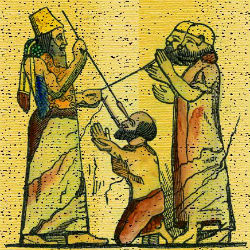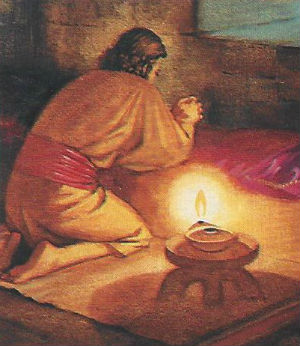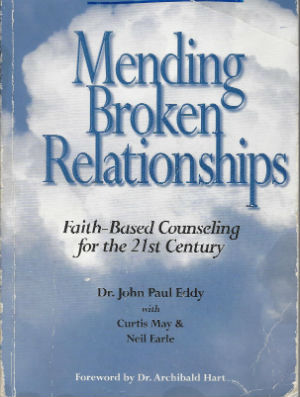Will God Forgive Me?
By Neil Earle
At
the end of the day most Christians thinking quietly in their beds at
nights aren’t bothered by big questions of theology. It’s
more like a simple but important series of worrisome queries:
He Was The Worst…
Of
all the bad kings in Israel and Judah’s history King Manasseh
was the worst. And he was the son of a righteous king, Hezekiah!
Well,
sometimes young people like to stiff their parents as many can
testify. Here’s the file on Manasseh:
“He
did evil in the sight of the Lord, following the detestable practices
of the nations the Lord had driven out…He bowed down to all
the starry hosts and worshipped them…he sacrificed his sons in
the fire in the Valley of Hinnom, practices sorcery, divination and
witchcraft, and consulted mediums and spiritists.The Lord spoke to
Manasseh and his people but they paid no attention” (2
Chronicles 33:2-6, 10).
Jewish
tradition says it was Manasseh who had the prophet Isaiah sawn
asunder (Hebrews 11:37). He was the worst!

Assyrians putting hooks in prisoner's lips as with King Manasseh. Click photo to enlarge.
But
then…something no one expected. Manasseh foolishly rebelled
against the all-conquering Assyrians and promptly got himself carried
off to captivity with a hook in his nose and bound with bronze
shekels. And then something unexpected happened:
“In
his distress he sought the favor of the Lord his god and
humbled
himself greatly before the God of his fathers. And when he prayed
to him the Lord was moved by his entreaty listened to his plea; so he
brought him back to Jerusalem and to his kingdom. Then Manasseh knew
that the Lord is God” (2 Chronicles 33:12-13).
Would
even Ripley believe it?
Manasseh
after repentance and faith was not only pardoned and absolved of is.
He was restored back to his throne. He becomes an ancestor to Jesus
the Christ (Matthew 1:10).
What
a turnaround. It is perhaps the ultimate Old Testament example of
God’s unbridled mercy and forgiveness. Surely the mercy of the
Lord is from everlasting to everlasting. All made possible by what
the book of Hebrews has taken delight in showing – “we are
not of those who shrink back and are destroyed, but of those who
believe and are saved” (Hebrews 10:39).
Christ’s
sacrifice was retrospective, covering the sins o Manasseh and it as
prospective covering your and mine. Thank God for his loving
kindness.

There is relief in real repentance.
Am
I right with God?
Will
God forgive me?
And
finally, the climax: “Have I committed the Unpardonable Sin?”
The
answer to that last one is a robust and resounding “NO!”
The
peculiarity of the question about the unpardonable sin is that if
you worry about it, it means you haven’t committed it.
Gary
Cockerill in a recent commentary on Hebrews 10:26 writes about
willful sin and the prospect of no forgiveness: “Let all who
are aroused to concern by the force of his warning take heed, yet let
them also take comfort. Those whom the pastors’ words evoke
concern have not come to such a destiny, for the ears of those who
have arrogantly insulted the Spirit of grace are deaf to his pleas.”
In
other words, if you think you have committed the unpardonable,
that’s proof you haven’t.
Sin’s Broad Sway
Ministers
get to know a lot of people and like the great Victorian preacher
Charles Spurgeon said years ago, I have not personally met anyone who
has ‘trampled the Son of God underfoot” or “insulted
the Spirit of grace” (Hebrews 10:29).
Yes,
like lawyers and doctors we ministers get to see people at their
worst. We can list many rangy, obstreperous, obnoxious and even
dangerous people over the decades but none of those I can
recollect are in this condition of total rejection of God’s
work in Christ. Perhaps there were/are, but not to my remembrance.
Of
course we should all be worried about sin and that is a big theme in
Hebrews 10:26-39. Remarks about “judgment and raging fire,”
“a dreadful thing to fall intro the hands of the living God”
and warnings not to “shrink back” are rounded out by
Hebrews 10:39, “But we are not of those who shrink back and are
destroyed, but of those who believe and are saved.”
Mercy
always follows judgment, as sinners such as King David and Simon
Peter experienced. To be close to God as a Christian is indeed to be
close to the possibility of fiery judgment, but that fire is refining
as numerous Scriptures attest (Malachi 3:2-3).
Sin
is bigger and broader than any of us can even be aware of let along
manage and control all the days of our lives. The definition expands
out even away from the “lawbreaking” issue. It gets into
the heart. Thus, “the thought of foolishness is sin” and
whatever falls short of full faithful responses is sin in Romans.
Sinner and Righteous?
That
tormented sinner, Martin Luther, won his way through to the peace of
God when he realized that the key to the issue was faith. That faith
God gave him through the Spirit. He coined a very powerful
phrase – “simul justus et peccator” which can
mean “I’m justified yet still a sinner.”
Christ lived a perfect life and through the Spirit Jesus lived in
Luther as he does in all Christians.
Not
all churches and ministries have held such a balanced view of grace
working through faith for indeed it is hard to hold on to this
healthy concept across our own lives. Like quicksilver.
Another
aspect of sin and the Christian life is the question, Will I run out
of time? How much time will God give me? And that one I usually
answer, “As much time as it takes.”
This
mercy of God towards the truly repentant is best explained in a life
story. Let me introduce you to Andreas, a man I knew from Eastern
Europe. Andreas had been sexually abused by his grandfather and his
parents were not close. They sent him to an orphanage, a “step
up” Andreas told me with a smile on his face.
Never Forsaken!
In
1963 the family moved to Canada and Andreas earned a reputation as a
tough guy in school but always sticking up for the underdog. He was
sent to Catholic school where he excelled in soccer but that couldn’t
stop him from succumbing to those radical torrents of guilt and abuse
coursing through his mind and spirit. By age 16 he had stolen 100
cars. At age 8 he faced 75 criminal charges for theft and armed
robbery. The only good thing was meeting his wife, Theresa, who
somehow believed in him. One day watching a religious movie he felt
the character playing Jesus was looking right at him and that scared
him into reading a Bible for the first time in his life.
Now
he knew there was a God and he needed this early seed sowing for he
was out of jail on $100,000 bail and a court case coming up.
Losing a bet on a football game he threw a beer bottle through the TV
and his wife finally walked out. That really crushed him. He prayed as
never before. Slowly he began to hear the voice of the Holy Spirit
showing him God had indeed been with him. He was living in peaceful
Canada, he had learned from his years at the orphanage, while
involved in a car accident while DUI he crashed into a lady's car but
her little baby in the back was unscratched. “It was a miracle.
The police were dumbfounded that nobody was killed,”

Peter could preach repentance and forgiveness for he had experienced it himself after denying his Lord.
These
acts of grace subdued his tempestuous spirit and Theresa returned to
him. She knew there was another Andreas inside. About to face court,
he fired his lawyer and decided to defend himself with God’s
help. The judge was pondering the sentence. Armed robbery, a serious
charge but during the crime Andreas had helped a lady with a baby who
testified on his behalf.
“The
judge hands the sheet to the bailiff. Then he pulls it back,”
Andreas told me,”He tears up the paper. For a long time the
judge stares out the windows. He shakes his head. He rewrites the
sentence. The bailiff reads it. I was so scared all I heard was
twelve. I thought, oh, no twelve years. But the prisoner next to me
is pumping my hand and congratulates me, all excited. Twelve months,
it was twelve months.”
Andreas
was praying for “a deuce and a day” – two years! Twelve
months was a great break. God was still with him.
He
went back to the cell hoping to get a Bible to read and lo and behold
there was one already on his bed. He turns to Luke 15 – the
prodigal Son. “Thank you, God.”
The
inmates hear of his story. One prisoner asks if it will work for him.
“Of course God will help you,” Andreas replies. The
prisoner fires his lawyer, prays to God and gets his sentence cut in
half.
Soon
Andreas is leading forty or so inmates to pray with him some nights
before shut-down. The guards are suspicious. “Don’t worry
this is a good things,” says Andreas. “Ill explain it in
the morning.”
Andreas
is assigned to work in the kitchen where his natural enthusiasm
convinces dozens of inmates to watch religious television. He asks
for church literature and is baptized upon his release in May, 1984.

For help with support groups request our free book.
The Body Reaches Out
End of story?
No.
Not quite. “Even after all that the drugs in my body still had
such a strong hold. It was very strange. God had given me so many
victories yet some of the addictions still stayed. Later on I felt
God explained that to me as, When you fall you will know that I am
there for you. Always remember the righteous man falls seven times
but gets up again.”
Now
begins his real long-term Christian struggle. At its best the church
is the ultimate support group. “I was up and down. It was very
frustrating to me and my ministers trying to deal with this. No one
seemed to know what to do. Then came 1987 and the local churches
started a support group for people like me called the Invitational
Bible Study.” (See Chapter 7 in the book “Mending Broken
Relationships” at atimetoreconcile.org.)
Andreas
had a tough discouraging battle but “what impressed me about my
ministers was that here were well-educated people who, as far as I
know, came from good homes, and never experienced some of these
things, yet here they were meeting with us, counseling us, telling us
God was on our side, and actually going to the AA and narcotics
Anonymous meetings with us. It was the blend of Bible encouragement
with community counseling that made the difference.”
Finally,
in 1989, after attending a detoxifying clinic in New Orleans, Andreas
began to get the last convulsions off his back. He was 18 years clean
and sober when I last met him in 2007. Truly, it is no secret what
God can do.
Andreas
shows God will give us the time we need and the help we need and that
he will never give up on us. Most of Andreas' sins were on the
outside, external. And pastors sometimes feel it is easier for such
people to see themselves and to seek God’s help as St. Paul
himself alluded to in 1 Timothy 5:24. Sins of the
spirit – self-righteousness, chicanery, deceit – these are
more serious ultimately because harder to spot. Either away, even
these are not unpardonable to those who seek God’s
loving-kindness. Andreas’ life proves it.

 There is relief in real repentance.
There is relief in real repentance. Peter could preach repentance and forgiveness for he had experienced it himself after denying his Lord.
Peter could preach repentance and forgiveness for he had experienced it himself after denying his Lord. For help with support groups request our free book.
For help with support groups request our free book.